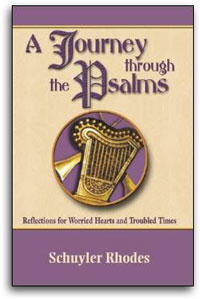Psalm 82
Preaching
A Journey Through the Psalms: Reflections for Worried Hearts and Troubled Times
Preaching the Psalms Cycles A, B, C
God is taking stock of the way the gods, and note the small "g" here, are handling things. "How long," they are asked, "will you judge unjustly and show partiality to the wicked?" Good question. In a nation where 40% of the people have no health care worth mentioning, and in a time when the promises of pensions can evaporate with the bang of a judge's gavel, it is a good question, indeed. Injustice spreads like an infectious disease as more and more prisons are built in the shadows of crumbling schools and declining quality of education. It is not a slick liberal voice, or some practiced politico who asks, but God almighty. How long? How long will the poor carry the rich upon their backs while they get weaker and the bloated wealthy get heavier. How long?
Perhaps it is a rhetorical question, because it is followed by a directive, which indicates that God's patience is growing thin. There is thunder in the holy utterance: "Give justice to the weak and the orphan!"
Walk down almost any street in the United States and the weak are there to be seen. Homeless people, bent over by the rigors of street living; sick, tired, dying. It doesn't take a vivid imagination to paint a picture of justice for these people. It is a canvas brushed over with images of decent homes, jobs, health care, and a sense that they, too, matter. But it doesn't end with merely the weak. God clearly stands here on the side of those whom these lesser gods use as fodder. And indeed, judgment is coming.
How does the clarity of holy words such as this hit good religious folk in this day and age? What is the response of decent pew sitters who hear the voice of God calling for justice for the weak? Is it time for another prayer? Did we just see the pastor signal the organist to slide into another chorus of "Nearer My God To Thee"? Is it time to step over another prostrate figure on the sidewalk on the way to worship?
No, the days of numb acquiescence to the status quo are at an end. God speaks to the people and demands justice for the weak and the poor. God sits at table with the well-fed, prosperous, over-entertained and asks, "How long?" How long will this suffering be allowed to continue? How long will good Christians rest in comfort while poor people suffer?
The psalmist could not have read it, but may well have enjoyed Jesus' parable of the sheep and the goats. "If you did not do it to the least of these ... you did not do it to me ..." (Matthew 25:31-46).
Perhaps it is a rhetorical question, because it is followed by a directive, which indicates that God's patience is growing thin. There is thunder in the holy utterance: "Give justice to the weak and the orphan!"
Walk down almost any street in the United States and the weak are there to be seen. Homeless people, bent over by the rigors of street living; sick, tired, dying. It doesn't take a vivid imagination to paint a picture of justice for these people. It is a canvas brushed over with images of decent homes, jobs, health care, and a sense that they, too, matter. But it doesn't end with merely the weak. God clearly stands here on the side of those whom these lesser gods use as fodder. And indeed, judgment is coming.
How does the clarity of holy words such as this hit good religious folk in this day and age? What is the response of decent pew sitters who hear the voice of God calling for justice for the weak? Is it time for another prayer? Did we just see the pastor signal the organist to slide into another chorus of "Nearer My God To Thee"? Is it time to step over another prostrate figure on the sidewalk on the way to worship?
No, the days of numb acquiescence to the status quo are at an end. God speaks to the people and demands justice for the weak and the poor. God sits at table with the well-fed, prosperous, over-entertained and asks, "How long?" How long will this suffering be allowed to continue? How long will good Christians rest in comfort while poor people suffer?
The psalmist could not have read it, but may well have enjoyed Jesus' parable of the sheep and the goats. "If you did not do it to the least of these ... you did not do it to me ..." (Matthew 25:31-46).


